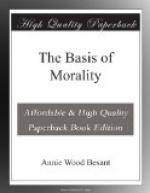The chief attack on the theory of Utility as a basis for morality has come from Christians, and has been effected by challenging the word “happiness” as the equivalent of “pleasure,” the “greatest number” as equivalent to “individual,” and then denouncing the maxim as “a morality for swine”. “Virtue” is placed in antagonism to happiness, and virtue, not happiness, is said to be the right aim for man. This really begs the question, for what is “virtue”? The crux of the whole matter lies there. Is “virtue” opposed to “happiness,” or is it a means to happiness? Why is the word “pleasure” substituted for “happiness” when utility is attacked? We may take the second question first.
“Pleasure,” in ordinary parlance, means an immediate and transitory form of happiness and usually a happiness of the body rather than of the emotions and the mind. Hence the “swine”. A sensual enjoyment is a “pleasure”; union with God would not be called a pleasure, but happiness. An old definition of man’s true object is: “To know God, and to enjoy Him for ever.” There happiness is clearly made the true end of man. The assailant changes the “greatest happiness of the greatest number” into the “pleasure of the individual,” and having created this man of straw, he triumphantly knocks it down.
Does not virtue lead to happiness? Is it not a condition of happiness? How does the Christian define virtue? It is obedience to the Will of God. But he only obeys that Will as “revealed” so far as it agrees with Utility. He no longer slays the heretic, and he suffers the witch to live. He does not give his cloak to the thief who has stolen his coat, but he hands over the thief to the policeman. Moreover, as Herbert Spencer pointed out, he follows virtue as leading to heaven; if right conduct led him to everlasting torture, would he still pursue it? Or would he revise his idea of right conduct? The martyr dies for the truth he sees, because it is easier to him to die than to betray truth. He could not live on happily as a conscious liar. The nobility of a man’s character is tested by the things which give him pleasure. The joy in following truth, in striving after the noblest he can see—that is the greatest happiness; to sacrifice present enjoyment for the service of others is not self-denial, but self-expression, to the Spirit who is man.
Where Utility fails is that it does not inspire, save where the spiritual life is already seen to be the highest happiness of the individual, because it conduces to the good of all, not only of the “greatest number”. Men who thus feel have inspiration from within themselves and need no outside moral code, no compelling external law. Ordinary men, the huge majority at the present stage of evolution, need either compulsion or inspiration, otherwise they will not control their animal nature, they will not sacrifice an immediate pleasure to a permanent increase of happiness, they will not sacrifice personal gain to the common




